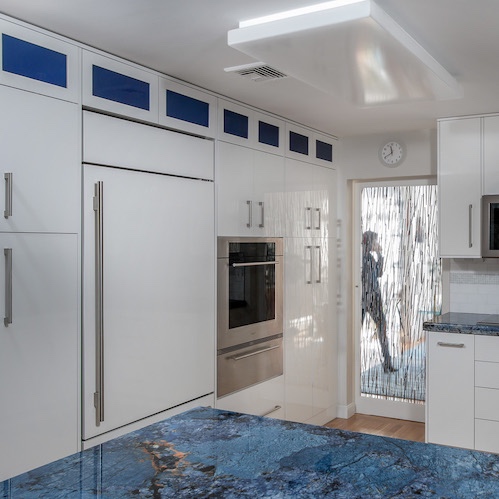Appliances for 21st Century Kitchens Part One: Refrigeration
Refrigeration is fully integrated and flush in-set in this kitchen with white lacquer cabinetry.
Your great-grandmother might not recognize the appliances in 21st Century kitchens. Today we use an array of appliances to preserve and cook food; these products have become much more sophisticated over the decades. Let’s start with the three basics: refrigerators, ovens and cooktops. Part one of our appliance blog series deals with refrigeration.
The kitchen design usually dictates what kinds of appliances will fit in the available space. Many a kitchen remodel has been driven by the desire to accommodate a professional size, built-in refrigerator! Style plays an important role in determining how everything will play together. In a modern kitchen, sleek cabinetry may completely disguise appliances that are flush, in-set and integrated into the space like the image of the white kitchen above.
Iceboxes evolved into electric refrigerators from brands like Frigidaire (parent company of Electrolux) and GE, still manufacturing and selling refrigerators alongside companies such as Sub-Zero, Bosch, and KitchenAid. Most luxury appliances offer a staggering number of options and benefits for peak performance.
TYPES OF REFRIGERATORS
Here are a few basics you need to know when looking for refrigeration for your kitchen:
Built-In Refrigerators:
Built-in refrigerators are taller and cabinet depth, which means they are usually 24" deep. They come in many different sizes, ending at 48" wide. Built-in fridges are taller than their free-standing counterparts, most being at 84" tall. They can be combined with separate freezers and wine coolers, to name a few. (See image below)
Integrated refrigerators:
These may be free-standing refrigeration that employ cabinetry on the doors to mesh with the rest of the kitchen to create a unified look. Some models that are not built-in can accept panels as well. (They do not have the typical stainless or white door on the front…)
Built-in & Integrated Refrigerators:
These are pro-style, built-in refrigerator that have cabinetry panels on them to blend with the rest of the kitchen. Typically they are 84” high. The purpose is to create a unified look in the kitchen. (See image below.)
Flush in-set refrigerators:
Refrigeration (usually built-in) that is installed behind cabinetry and completely flush with all of the cabinetry along the wall. In some cases, there aren’t even handles on the cabinetry, disguising the refrigerator even more thoroughly! (Image above)
Free-standing refrigerators/counter-depth or cabinet-depth:
A free-standing refrigerator that is meant to appear built-in by not extending past the cabinet or counter depth but does not have any cabinetry on the doors. Usually the refrigerator doors extend past the counter/cabinetry, however. A clue that the refrigerator may be free-standing.
Refrigerator and freezer drawers:
Companies such as Fisher Paykel came out with refrigerator drawers (and dishwasher drawers) and this freed up designers to expand how and where food could be stored throughout the kitchen! These are built-in and very much integrated into the overall design and function of the space.
BASIC BLACK? REFRIGERATOR FINISHES
Back in the day most refrigerators were white. In the 1950s and 1960s you had pink and avocado green fridges. Then came the stainless-steel era. Professional kitchens had clear glass refrigerators which worked their way into residential kitchens with models like True, GE and Sub-Zero. Refrigerator finishes are yet another consideration if you’re not integrating your appliances with cabinetry panels.
Refrigerators now come in a rainbow of colors and finishes from stainless to matte black - inside and out from Jenn-Air to Slate from GE. Retro companies such as Elmira Stoveworks, Big Chill and Smeg offer many other hues like red, orange, yellow, blue and green.
FUNCTIONALITY
Let’s talk about function for moment because 21st Century refrigerators have a lot more going on behind the doors than they used to. First of all, shelving is all very versatile. You can move shelves to create one large shelf or shelves at varying heights, depending on what is being stored.
As flexible as refrigerators have become, they are also very specific now. Different compartments can preserve food at different temperatures, for example. The traditional freezer-refrigerator combination has been turned on its ear, too. The Samsung Door Flex has four separate doors and compartments that can switch from refrigerator to freezer with the touch of a button.
The benefit of French door refrigerators is that they can be used in tighter spaces where you do not have the ability to open wide doors. They often have a freezer drawer on the bottom. Freezers can be at the top, bottom, or side of the refrigerator, depending on the model you desire. There are models with options for just about every taste and budget.
Although we will go into this in further detail in a future blog post, refrigerators are a lot smarter than they used to be. In the old days, the self-defrosting feature was a big deal. Today’s refrigerators can send you a message to tell you that you’re running low on milk! Samsung has a model with a built-in “family hub” computer screen with apps to find recipes, create shopping lists and more.
Stay tuned to read Appliances Part Two: about Ranges, Ovens and Cooktops in our next appliance blog. Followed by Part Three: hoods, microwave drawers, dishwashers, hi-tech in the kitchen, and other small appliances that have revolutionized the kitchen.
Need help selecting the right refrigeration for your project? Fear not. We provide guidance and hands-on shopping services for our clients.
Integrated Refrigeration
Built-in, counter-depth refrigeration.



